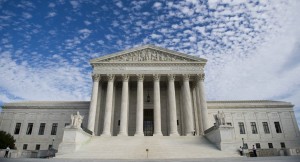In its recent ruling in McCutcheon v. Federal Election Commission, the Supreme Court struck down yet another provision of federal campaign finance law as a violation of the First Amendment‘s free speech guarantee.
This time it was the Bipartisan Campaign Reform Act’s limitation on the aggregate amount of contributions — presently $123,200 — that a donor may contribute to all candidates or party committees in one election cycle.
Of course, McCutcheon follows the now-famous Citizens United ruling, in which the Court held that the BCRA provision restricting corporations and unions from making expenditures advocating the election or defeat of a candidate violates the free speech rights of those entities.
Like Citizens United, McCutcheon was another 5-4 decision. While the case was narrowly decided, the gulf between the understanding of the majority and the dissenters of the First Amendment’s meaning is wide.
Indeed, two different conceptions of the role of individual rights in our constitutional regime emerge.
In his dissent, Justice Stephen Breyer asserts that “the First Amendment advances not only the individual’s right to engage in political speech, but also the public’s interest in preserving a democratic order in which collective speech matters.”
The emphasis on “matters” is Breyer’s. But I think what matters most in his statement is the reference to “collective speech,” a term with somewhat Orwellian overtones.
Contrast Breyer’s language with this from Chief Justice John Roberts‘ majority opinion:
“The First Amendment safeguards an individual’s right to participate in the public debate through political expression and political association.”
Roberts declares the First Amendment is intended to remove governmental restraints from the arena of public discussion, “putting the decision as to what views shall be voiced largely in the hands of each of us.”
The contrast between Breyer’s emphasis on “collective speech” and Roberts’ focus on an “individual’s right” is rather stark.
And to my mind, Breyer’s formulation is disturbing. The Bill of Rights — of which the First Amendment is foremost — were added to the Constitution to protect fundamental individual liberties from abrogation by popular majorities, not to secure some notion of collective rights.
A window into Breyer’s thinking concerning “collective speech” may be gleaned from his citation toJean-Jacques Rousseau, whom the justice rightly calls “an influential 18th century continental philosopher.”
Rousseau was indeed an influential philosopher but, thankfully, not one whose thinking greatly influenced our Founders.
It is widely acknowledged that they looked for guidance foremost to John Locke and Montesquieu.
Rousseau is best known for his theory of the “general will,” elaborated in his major work, The Social Contract.
In a nutshell, Rousseau’s philosophy requires the individual to submerge his own ideas to what he calls the “general will,” which Rousseau explains this way:
“When, therefore, the opinion opposed to my own prevails, that simply shows I was mistaken, and what I considered to be the general will was not so. Had my private opinion prevailed, I should have done something other than I wished; and in that case I should not have been free.”
It is easy to see that Rousseau’s philosophy nurtures collectivist thinking — including notions of the primacy of “collective speech” — rather than an appreciation for the role of individual rights in a democratic society.
Indeed, in philosophical terms, you can draw a reasonably straight line from Rousseau to Georg Wilhelm Friedrich Hegel, then to Karl Marx.
The pronounced collectivist bent of this philosophical line, with its notions of state supremacy over the individual, differs significantly from the line running from Locke to David Hume, to James Madison and on to John Stuart Mill.
Do not get me wrong. I am not suggesting that Breyer, by relying on Rousseau for support, is a devotee of Hegel or Marx.
I am only suggesting that his conception of the First Amendment, focusing as it does on the promotion of collective speech values, necessarily disfavors protecting an individual’s right to free speech and the other individual liberties that the Bill of Rights are intended to secure.
[Originally published at Washington Examiner]




